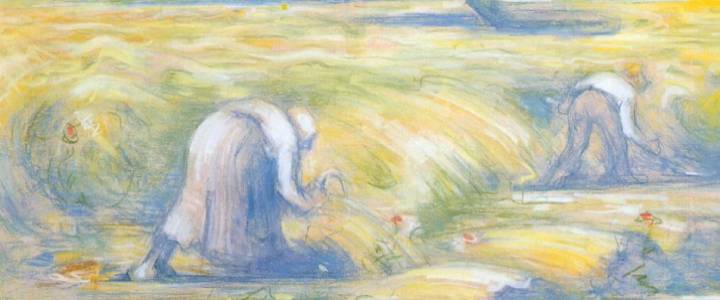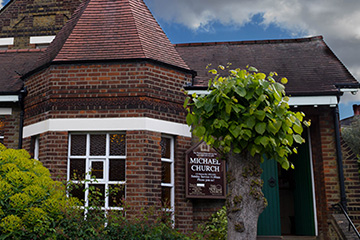Isn't it interesting that we have a special day to celebrate harvest, to stop to say thank you? After all, the Lord is the most important person in the universe, the source of all our blessings, of eternal forgiveness for our many missteps, the One whose presence allows us to live and breathe and choose. Why would we need a special day to stop and pay attention to One so important to our peace and happiness?
And yet we do. Daily life is such that we focus on the task at hand, be it doing the dishes, doing our job, or helping a friend. Even when we are trying to be spiritual people, that effort tends to focus our minds on doing the dishes or helping the friend cheerfully, rather than resentfully. We know intellectually that the Lord is present, and we might ask for His specific presence in the activities we are engaged in, but the nature of life in this world is that it is focused on the tasks to be accomplished in the world.
And so we need to stop to give our attention to the Lord, and that stopping takes effort and concentration. That's why we have to wrest our attention back to saying the Lord's Prayer, rather than thinking about the task we need to undertake tomorrow, as our mouths say the words. And that's why, when our minds drift as we read the Word, the most precious books ever written, we have to choose to stop and pay attention to the Lord.
It is part of the plan that focusing on the Lord comes after other things, as the following teaching about the Ten Commandments points out:
Since a conjunction of the Lord with a person is possible, and of a person with the Lord, therefore there are two tables of the Law, one for the Lord, and the other for people. To the extent that a person obeys as though of himself the laws of his table, to the same extent the Lord enables him to obey the laws of His, the Lord's table.
But a person who does not obey the laws of his table, all of which have to do with love for the neighbour, is incapable of obeying the laws of the Lord's table, all of which have to do with love for the Lord. How can a murderer, thief, adulterer, or false witness love the Lord? (Divine Providence 95; Doctrine of Life 57; Apocalypse Explained 1026:3, 1027:4)
In Scripture the Lord says,
If you keep My commandments, you will abide in My love... This is My commandment, that you love one another as I have loved you. Greater love has no one than this, than to lay down one's life for his friends. You are My friends if you do whatever I command you. (John 15:10, 12-14)
The first step in all of our lives is to love the neighbour, and by doing so we love the Lord. Paying attention to serving those around us is what we all should focus on.
But there's also that first table of the Ten Commandments – don’t worship other gods, don't take the name of the Lord in vain, remember the Sabbath day. The more we pay attention to the commandments on the second table, the more we come to see the value of stopping, to give attention to the ones of the first table.
On the outside, worshipping one God, not taking the Lord's name in vain and remembering the Sabbath can seem less important than avoiding murder and adultery, and rightfully so on one level. But looking a bit deeper, we find that paying attention to the Lord more in our lives changes our motives for obeying all the other commandments. We've all compelled ourselves to do what we know we should, and that is honourable. But how much more pleasant it is to spontaneously desire to do what is good and true! This is what stopping, to pay attention to the Lord, begins to enable.
On one level a harvest celebration can seem rather quaint and antiquated, a relic of the past when good harvests meant food would not be scarce in the coming winter. On another, it can seem superfluous in that we should be paying attention to the Lord anyway without the prompt of a special event. Yet we know that it is vitally important. No matter how much we want to focus on the Lord, daily life calls our attention away from Him, and can even make giving time to Him challenging. Our goal in stopping, to give thanks, is to train ourselves to turn to Him more often, and in doing so to allow Him more fully to become the source of all we do.
Find out more about the teachings of the New Church and how it can relate to real life issues
Come and join us at Michael Church, a spiritually dynamic church in South London



